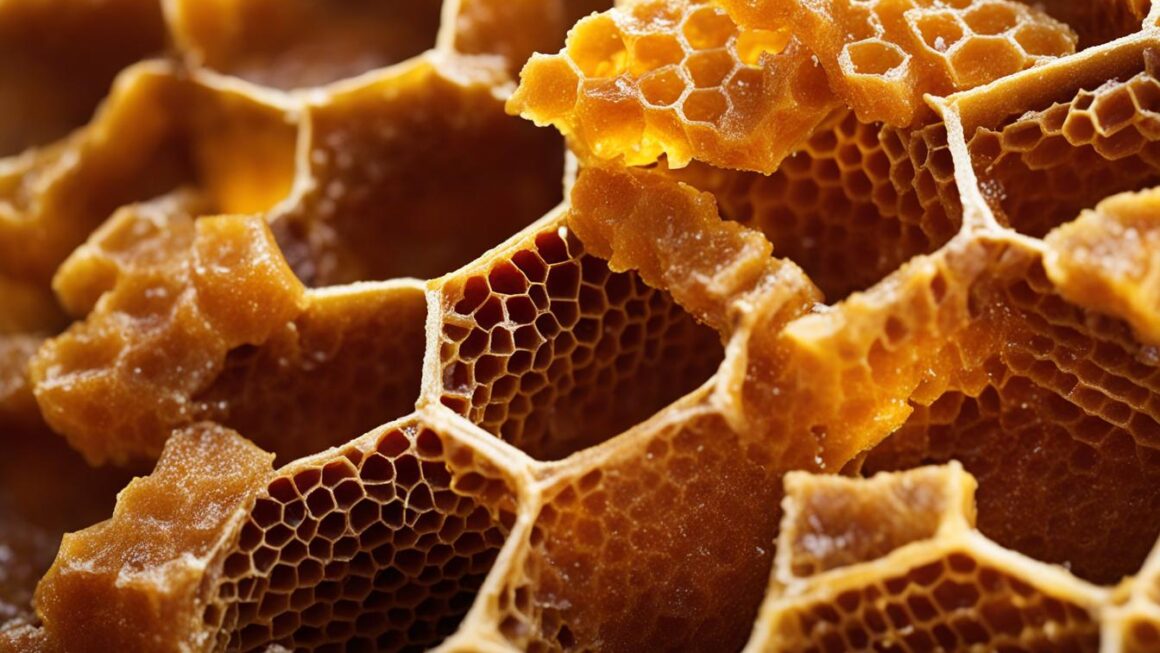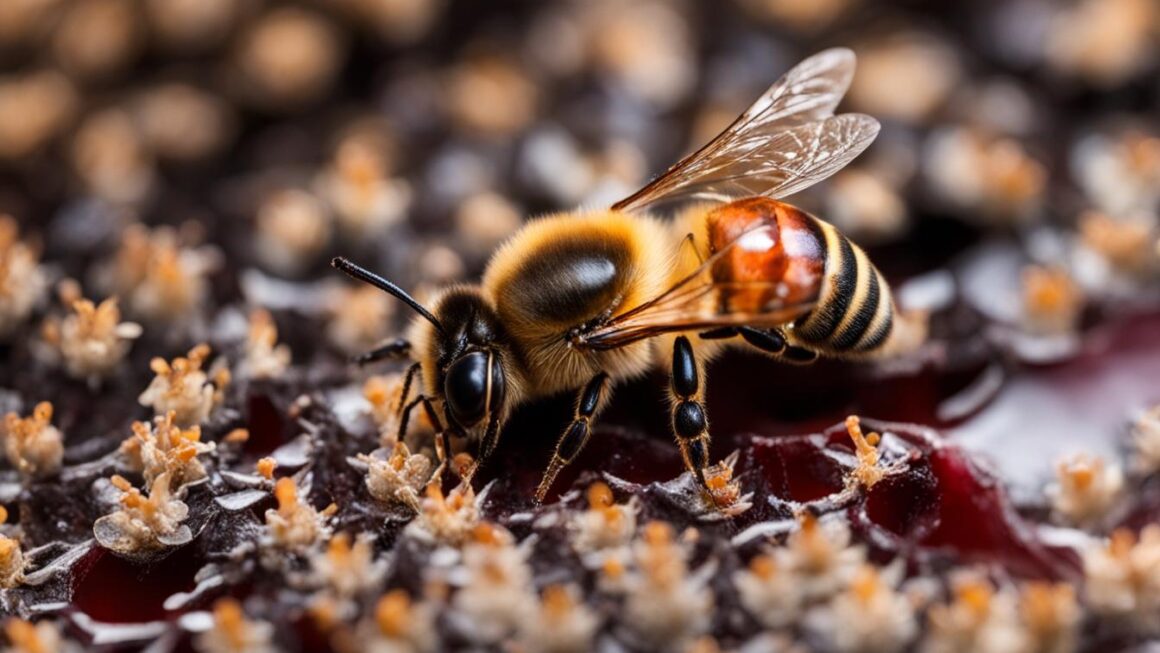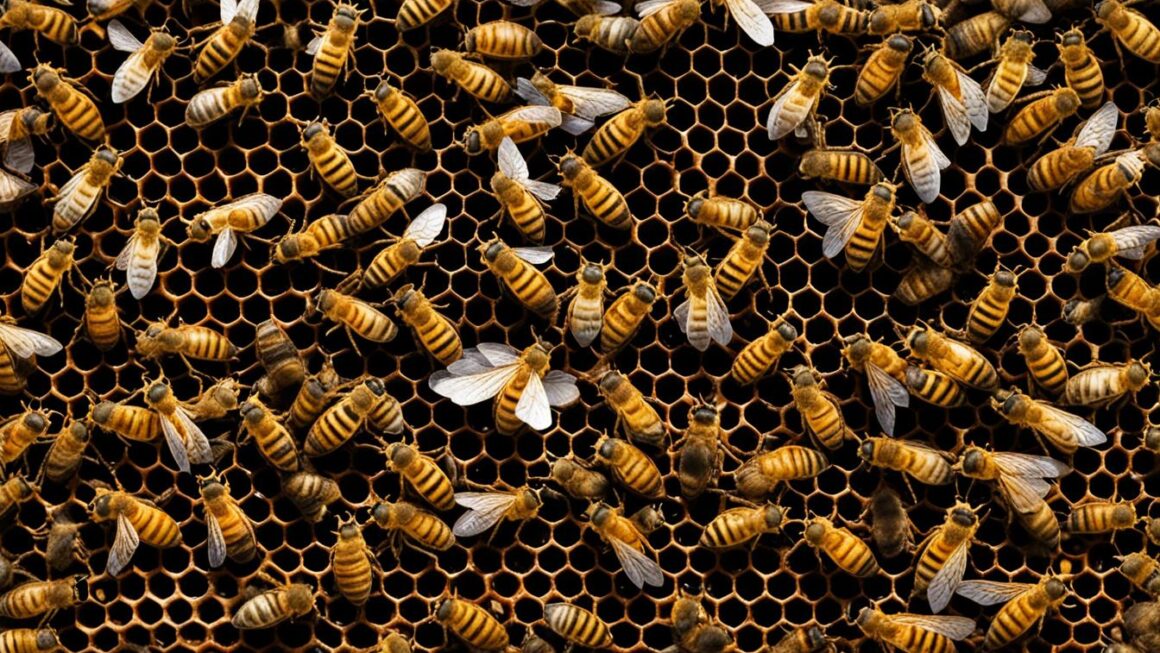Honeycomb has been a delicacy for centuries, and many people enjoy it in its natural form. But is it safe to eat honeycomb raw? In this guide, we’ll explore the benefits of consuming honeycomb in its natural state, its nutritional value, and whether it’s safe to eat.
Raw honeycomb is the honeycomb that comes straight from the beehive. It is often sold as a whole piece, and the honey is still inside the cells. Raw honeycomb has a unique flavor and texture and is considered a delicacy by many.
But what are the benefits of consuming raw honeycomb? And is it safe to eat? Let’s dive in and find out.
Key Takeaways:
- Raw honeycomb is the honeycomb that comes straight from the beehive and is sold as a whole piece.
- Consuming raw honeycomb can offer various health benefits and nutritional value.
- It’s generally considered safe to eat honeycomb in its natural form, but individuals with specific allergies or health conditions should exercise caution.
- Raw honeycomb is a unique delicacy with a distinctive flavor and texture.
- Throughout this guide, we’ll explore the safety, nutritional value, and benefits of consuming honeycomb in its natural form.
Is Eating Raw Honeycomb Safe?
Raw honeycomb is a delicious and nutritious food that is enjoyed by many. However, before consuming it in its natural form, it’s important to consider the potential risks.
The first concern is the presence of bee pollen, which is a common allergen. Individuals with pollen allergies may experience allergic reactions when consuming honeycomb. Additionally, there is a risk of bacterial contamination, particularly if the honeycomb is not harvested and stored properly. While rare, bacterial infections from consuming raw honeycomb have been reported.
Despite these risks, many individuals safely consume raw honeycomb without issue. It’s important to purchase honeycomb from a reputable source and to ensure it is fresh and properly stored.
Honeycomb Nutrition Facts
Raw honeycomb is a rich source of vitamins, minerals, enzymes, and antioxidants. A tablespoon (21 grams) of honeycomb contains:
| Nutrient | Amount |
|---|---|
| Calories | 64 |
| Carbohydrates | 17 grams |
| Protein | 0.2 grams |
| Fat | 0 grams |
| Vitamin C | 0.1 milligrams |
| Calcium | 2 milligrams |
| Iron | 0.1 milligrams |
| Potassium | 11 milligrams |
As you can see, honeycomb is a low-calorie food that is high in carbohydrates. It’s also free of fat and a good source of key nutrients like calcium and iron.
In conclusion, while there are some potential risks associated with consuming raw honeycomb, it can be a safe and nutritious food when purchased from a reputable source and properly stored. Plus, with its many health benefits and delicious flavor, honeycomb is a perfect addition to any diet.
The Nutritional Value of Raw Honeycomb
Raw honeycomb is packed with essential vitamins, minerals, enzymes, and antioxidants that provide numerous health benefits. Honeycomb is composed of three main components: beeswax, honey, and royal jelly. Each component has unique properties that contribute to the nutritional value of honeycomb.
The following table provides a breakdown of the nutritional composition of raw honeycomb:
| Nutrient | Amount per 100g |
|---|---|
| Calories | 320 |
| Protein | 1 g |
| Fat | 0 g |
| Carbohydrates | 80 g |
| Sugar | 73 g |
| Vitamin C | 2.3 mg |
| Calcium | 6 mg |
| Iron | 0.4 mg |
| Potassium | 52 mg |
| Phosphorus | 4 mg |
| Zinc | 0.2 mg |
As seen in the table, honeycomb contains a high amount of carbohydrates and sugar. However, unlike refined sugar, honeycomb contains a variety of different sugars that are slowly released into the bloodstream, providing sustained energy levels.
Raw honeycomb is also rich in antioxidants, which help protect the body against damage from harmful free radicals. The flavonoids and phenols present in honeycomb have been shown to reduce inflammation and lower the risk of chronic diseases such as heart disease and cancer.
The enzymes found in raw honeycomb also provide numerous health benefits. Enzymes are proteins that speed up chemical reactions in the body, aiding in digestion and other metabolic processes. The enzyme glucose oxidase is unique to honey and produces hydrogen peroxide, which has antibacterial properties and can help in wound healing.
In summary, raw honeycomb is a nutrient-dense food that provides a wide range of essential vitamins, minerals, enzymes, and antioxidants. Incorporating honeycomb into your diet can contribute to overall health and well-being.
Health Benefits of Consuming Raw Honeycomb
Raw honeycomb is packed with nutrients and offers a range of potential health benefits. Incorporating this natural delicacy into your diet can lead to improved well-being and enhance your overall health. Let’s dive into some of the specific health benefits of consuming raw honeycomb.
Immune-Boosting Properties
Raw honeycomb is known for its antibacterial, antiviral, and anti-inflammatory properties, which can help boost the immune system. It contains high levels of antioxidants, which protect the body against harmful free radicals that can cause damage to cells and tissues.
Antibacterial and Antifungal Properties
Studies have shown that raw honeycomb has potent antibacterial and antifungal properties that can help prevent infections and promote wound healing. Its high sugar content creates an environment that is unfavorable to bacterial growth, and its low moisture content can help prevent the growth of fungi.
Digestive Benefits
Raw honeycomb contains digestive enzymes that can help soothe the digestive tract and improve nutrient absorption. It’s also been found to have prebiotic properties, which can promote the growth of beneficial gut bacteria, leading to improved overall digestive health.
Relief from Allergies
Some people believe that consuming raw honeycomb can help alleviate allergy symptoms due to its small amounts of pollen and other allergens. While more research is needed in this area, it’s thought that regularly exposing the body to these allergens can help build up immunity over time.
Skin Health
Raw honeycomb has been used for centuries in traditional medicine to treat a variety of skin conditions, including acne, eczema, and psoriasis. Its antibacterial properties can help prevent infections, while its anti-inflammatory properties can help reduce redness and irritation.
Overall, consuming raw honeycomb can offer a range of health benefits and is a delicious way to enjoy the natural sweetness of honey. While it’s generally considered safe to eat honeycomb in its natural form, individuals with specific allergies or health conditions should exercise caution.
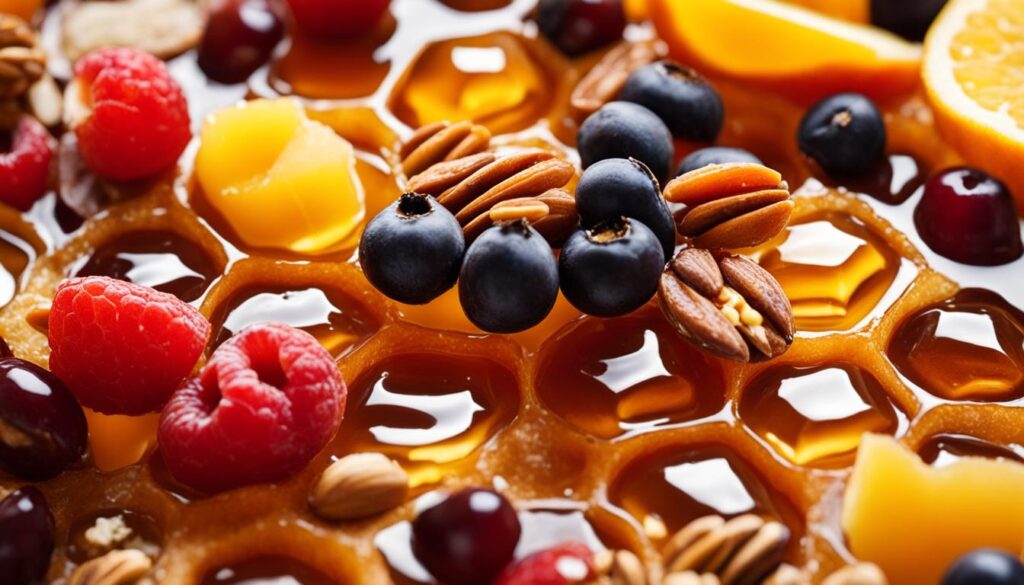
Honeycomb vs. Honey: What’s the Difference?
While both honeycomb and honey are products of bees, they have distinctive differences in terms of taste, texture, and use.
Taste: Honeycomb offers a unique flavor that differs from liquid honey. With a chewy texture and a burst of sweetness, consuming raw honeycomb can be a delightful experience for the taste buds. On the other hand, liquid honey has a smooth and consistent texture, with varying degrees of sweetness, depending on the type of honey.
Texture: The texture of honeycomb is quite distinct from that of honey. Honeycomb is made up of individual honey-filled cells, each with a waxy covering. When consumed, the waxy comb must be chewed before the honey can be extracted. In contrast, honey is a thick liquid that can be easily poured or drizzled onto food.
Use: Both honeycomb and honey can be used in a variety of culinary applications. Honey can be used as a natural sweetener in beverages, baking, and cooking. Honeycomb, on the other hand, can be added to cheese plates, paired with fruits, or used as a spread on toast. Some people even enjoy eating raw honeycomb as a snack on its own.
Honeycomb vs. Honey: Nutritional Comparison
When it comes to nutritional value, honeycomb and honey have slight differences. While both contain many of the same beneficial components, such as vitamins, minerals, and antioxidants, honeycomb has additional nutritional benefits due to its beeswax content.
| Nutrient | Honeycomb | Honey |
|---|---|---|
| Calories | 20 per tablespoon | 64 per tablespoon |
| Carbohydrates | 5 grams per tablespoon | 17 grams per tablespoon |
| Fiber | — | — |
| Protein | — | — |
| Fats | — | — |
| Iron | 2% daily value per tablespoon | — |
| Potassium | 1% daily value per tablespoon | — |
| Vitamin C | — | — |
| Vitamin A | — | — |
While honeycomb has fewer calories and carbohydrates than honey, it contains small amounts of iron and potassium. Additionally, the beeswax in honeycomb can aid in digestion and offer anti-inflammatory benefits.
Overall, both honeycomb and honey offer unique flavors and nutritional benefits. Choosing between the two may depend on personal preference and culinary application. However, incorporating raw honeycomb into your diet can provide a range of health benefits and nutritional value in its natural form, making it a great addition to any well-rounded diet.
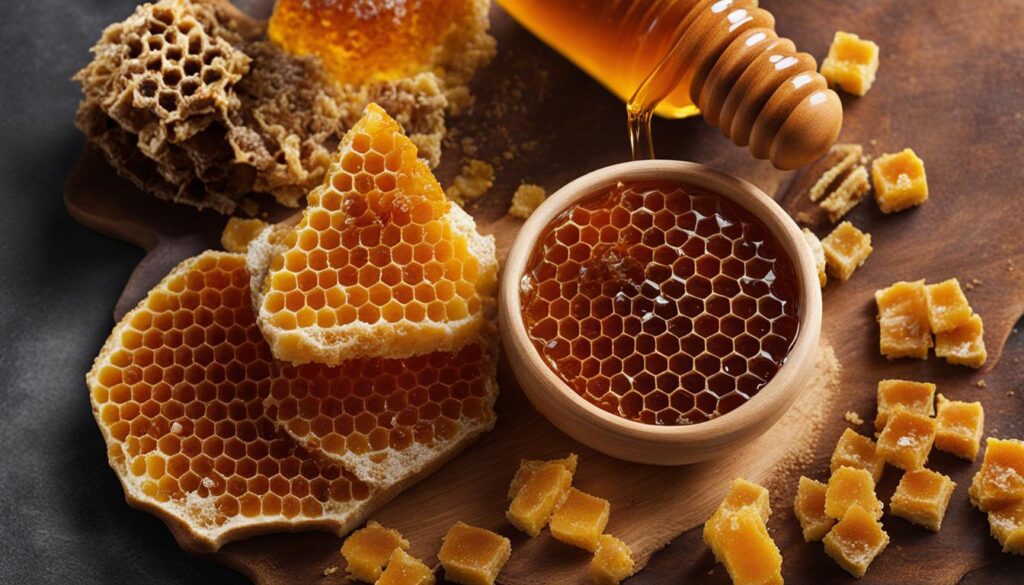
The Digestive Benefits of Honeycomb
Eating raw honeycomb can have a positive impact on your digestive health. Honeycomb is rich in enzymes that can aid in the digestion and absorption of nutrients in the gut. Some of the enzymes found in honeycomb include diastase, amylase and invertase. Diastase aids in the breakdown of starches, amylase in the digestion of carbohydrates and invertase in the metabolism of sugars.
In addition to enzymes, honeycomb also contains probiotics. Probiotics are known to promote healthy gut bacteria, which can improve digestion and help prevent gastrointestinal issues like constipation and diarrhea. The probiotics in honeycomb come from the bees’ saliva and can help improve the balance of gut bacteria in humans.
Honeycomb for Digestion
Consuming honeycomb for digestion can help soothe digestive issues such as acid reflux and indigestion. The anti-inflammatory properties in honeycomb can help reduce inflammation in the gut, resulting in less discomfort and improved digestion.
One study found that consuming honeycomb can help reduce levels of Helicobacter pylori, a bacteria that can cause stomach ulcers and inflammation. The study suggests that honeycomb could be a natural and effective treatment for individuals with H. pylori infections.
In summary, consuming raw honeycomb can improve your digestive health by providing essential enzymes and probiotics. It can aid in the digestion and absorption of nutrients, promote healthy gut bacteria, and help prevent gastrointestinal issues. As always, if you have specific allergies or health conditions, it’s important to consult with a healthcare professional before incorporating honeycomb or any new food into your diet.
Exploring the Benefits of Honeycomb
Raw honeycomb offers a wide range of health benefits that go beyond just its delicious taste. Let’s take a deeper look at some of the advantages of consuming honeycomb:
Improves Skin Health
The antioxidants and antibacterial properties found in honeycomb can help reduce inflammation and promote skin health. When applied topically, honeycomb can help soothe skin irritation and acne.
Supports Heart Health
Honeycomb contains flavonoids and phenolic acids that have been linked to reduced risk of heart disease. These compounds help improve blood flow and reduce inflammation, which can help prevent the development of cardiovascular issues.
Boosts Immune System
Raw honeycomb contains enzymes, antioxidants, and antibacterial properties that can help support a healthy immune system. These compounds work together to fight off harmful bacteria and viruses, helping to keep you healthy.
Assists in Digestion
Honeycomb has natural enzymes that can help break down food and improve digestive function. Additionally, the antibacterial properties can help reduce inflammation and irritation in the digestive tract, making it a helpful remedy for digestive issues like heartburn and diarrhea.
Aids in Weight Management
Due to its low glycemic index and ability to regulate blood sugar levels, honeycomb can be a helpful addition to a weight management plan. It also contains fiber, which can help you feel full for longer and prevent overeating.
With all of these benefits, it’s no wonder why raw honeycomb has become a popular health food. Incorporating honeycomb into your diet can be a great way to support overall health and well-being.
Can You Eat Beeswax?
When it comes to consuming honeycomb, beeswax is inevitably part of the equation. Beeswax is a natural substance produced by honeybees and is used to construct the cells of the honeycomb. So, can you eat beeswax? The answer is yes, but with some considerations.
Firstly, beeswax is not harmful to consume in small quantities, but it is not a significant source of nutrition. Beeswax is primarily composed of fatty acids and long-chain alcohols, which are not easily digested by the human body. Therefore, if you accidentally ingest small amounts of beeswax while consuming honeycomb, there is no need to worry.
Secondly, some people may have an allergic reaction to beeswax, which could cause symptoms such as swelling, hives, or difficulty breathing. If you are allergic to bees or have a history of allergic reactions, it’s important to exercise caution when consuming honeycomb.
Finally, beeswax may have some culinary uses, primarily in making candles, cosmetics, or as a coating for certain foods such as cheese. However, if you’re looking to consume beeswax in its pure form, it’s best to stick to small quantities and consider its potential impact on your diet.
If you’re interested in incorporating beeswax into your diet, it’s essential to ensure that the wax is pure and free from contaminants that may be harmful when consumed. It’s also important to note that beeswax may contain trace amounts of pesticides or other chemicals that were used in beekeeping practices, which could have a negative impact on your health.
Conclusion
While it is generally safe to eat beeswax in small quantities, there is little nutritional benefit to doing so, and individuals with allergies or sensitivity to beeswax should exercise caution. As with any food, it’s essential to understand the potential risks and benefits of consuming beeswax and make informed decisions based on your individual needs and circumstances.
Conclusion
In conclusion, raw honeycomb is not only safe to eat but also contains a range of health benefits and nutritional value. Its rich content of vitamins, minerals, enzymes, and antioxidants provides a natural way to support your overall health and well-being. However, it’s important to exercise caution if you have specific allergies or health conditions that may be affected by consuming honeycomb.
Final Thoughts
Whether you’re looking to enhance your digestion, boost your immune system, or simply enjoy the delicious taste of raw honeycomb, incorporating it into your diet can be a wholesome and satisfying way to do so. So next time you’re considering buying honey, try purchasing raw honeycomb instead and discover the wonders of nature’s sweet delicacy.
FAQ
Can you eat honeycomb raw?
Yes, honeycomb can be consumed in its natural form. It is safe to eat and can be enjoyed for its unique flavor and texture.
What are the benefits of eating raw honeycomb?
Raw honeycomb offers several potential health benefits. It is rich in antioxidants, vitamins, and minerals that can support immune function, improve digestive health, and promote overall well-being.
Is honeycomb nutritionally beneficial?
Yes, honeycomb is nutritionally beneficial. It contains essential nutrients such as carbohydrates, proteins, and fats, along with vitamins and minerals. These nutrients contribute to a healthy diet when consumed in moderation.
How does honeycomb differ from regular honey?
Honeycomb is the natural comb structure created by bees to store honey. It is usually consumed as a whole piece, whereas regular honey is extracted from the honeycomb and processed into a liquid form. The taste and texture of honeycomb can differ from regular honey, providing a unique culinary experience.
Can you eat beeswax found in honeycomb?
Beeswax, which is found in honeycomb, is edible but not typically consumed in large quantities. Some individuals may choose to chew or swallow small amounts of beeswax as part of enjoying honeycomb, but it is primarily appreciated for its role in honeycomb structure and culinary applications.
Are there any risks or precautions when eating raw honeycomb?
For most people, eating raw honeycomb is safe. However, individuals with allergies to bee products or specific health conditions should exercise caution and consult with a healthcare professional before consuming honeycomb. Additionally, it is important to source honeycomb from reputable sources to ensure quality and safety.
How can honeycomb benefit digestion?
Honeycomb contains natural enzymes that can aid in digestion and promote a healthy gut. These enzymes can assist with breaking down food particles and enhancing nutrient absorption, potentially alleviating digestive issues.
What other benefits does honeycomb provide?
In addition to digestion benefits, honeycomb offers a range of advantages. It can support skin health, assist with weight management, provide energy, and even have antibacterial properties. The unique combination of nutrients in honeycomb contributes to its various potential benefits.
Can honeycomb be used in cooking or baking?
Honeycomb can be used as a decorative element in dishes or enjoyed on its own. It is not commonly used as an ingredient in cooking or baking due to its texture and structure. However, it can add a visually appealing touch to desserts or cheese boards.

